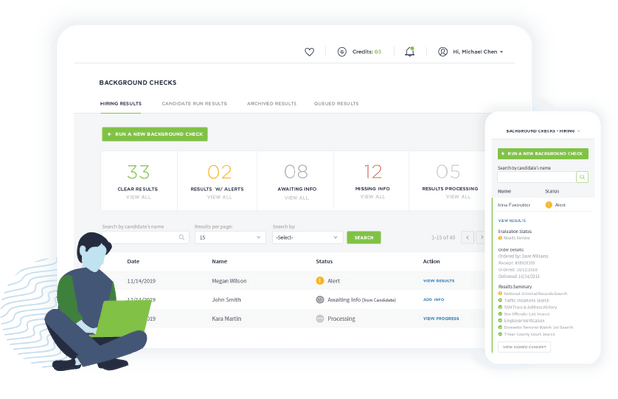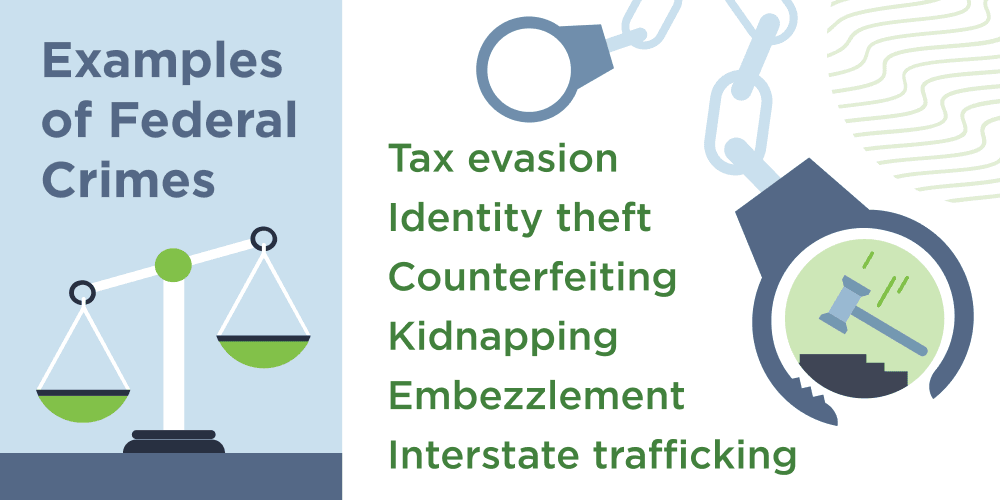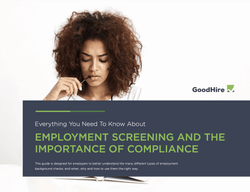Felonies vs. Misdemeanors vs. Infractions On A Criminal Background Check
When reviewing a criminal background check, it’s important to understand how offenses are categorized by relative severity, class or level.
Resourcesarticles
Sara Korolevich
16 min read
Click a chapter to scroll directly to it.
In industries where sensitive information and high-value assets are part of the job, employers may want to conduct a federal criminal background check. This type of background check searches the federal court system for convictions and pending cases tied to federal crimes. This article provides a comprehensive guide to federal background checks, detailing their purpose, findings, and process.
In today’s business world, where due diligence and caution are paramount, conducting federal background checks is an important aspect employers should consider when making hiring decisions. Keep reading to find out why federal criminal background checks are an important screening to include in a comprehensive background check.

A federal background check, or federal criminal background check, searches 94 federal US district and appellate courts to identify convictions and pending cases of federal crimes. For example, identity theft, tax evasion, counterfeiting, and kidnapping are all federal crimes. So are crimes against federal employees like TSA agents and forest rangers, crimes involving banks, and those committed on federal land like national parks.
A federal criminal background check is frequently used by companies in financial industries, as well as for executives and CPAs, to surface incidents involving fraud and embezzlement or identity theft.
Sectors that might benefit from—or require—a federal criminal background check on prospective candidates include law enforcement, education, finance and banking, healthcare, and jobs in the federal government and defense industry.
What do these jobs and industries have in common? People in these positions handle sensitive information, deal with high-value assets, or work with vulnerable people. A federal background check provides an added layer of protection and assurance when making informed hiring decisions.

Federal criminal background checks are different from FBI background checks because a federal background check involves searching federal criminal courts for convictions and pending cases and are often used by organizations when hiring for executive-level roles, and positions where the person is handling highly sensitive information. FBI background checks, on the other hand, go even deeper and often are limited to certain kinds of jobs in the federal government or at companies that contract with the federal government. This in-depth check finds all interactions an individual might have had with law enforcement, such as all felony and misdemeanor criminal convictions, arrests, traffic violations and even parking tickets.
Unlike a federal criminal background check, an FBI background check relies on fingerprints supplied by the job candidate. Those prints are then run through the FBI’s Integrated Automated Fingerprint Identification System (IAFIS), a storehouse of fingerprints collected by law enforcement agencies, immigration agencies and previous employment screenings. The IAFIS database connects an individual’s data to fingerprints collected as part of both criminal and non-criminal circumstances.
In addition, the candidate’s fingerprints are run through the National Crime Information Center (NCIC) database which contains a wealth of information about criminal histories and wanted criminals. The fingerprints also are checked against databases of sex offenders and terrorists.
FBI checks are generally limited to certain federal government and contractor roles. For most private employers, a federal background check provides sufficient data regarding federal offenses for informed hiring decisions.
Employers who work with a background screening provider to conduct pre-employment background checks must comply with federal laws and regulations, namely the Fair Credit Reporting Act (FCRA). This helps ensure candidates’ rights are protected throughout the background check process.
Under the FCRA, the candidate must be notified that you intend to run a background check. This is known as a background check disclosure. This should be provided in a self-contained document. Then, the candidate must give their permission for the background check to be conducted.
A job candidate must be told in writing that any information shown in a background check can be used in decisions concerning employment eligibility and hiring. The same is true if information in a background check is used to screen a current employee (for example, for a promotion, or for annual re-screening). This information must be provided in a written document.
If a background check leads to a decision against hiring, retaining, or promoting a candidate, you must follow the FCRA’s adverse action steps.
Using an FCRA-compliant screening provider, like GoodHire, can simplify compliance with the adverse action process through automated workflows that guide employers through every required step.
The federal government may conduct extensive background checks on potential employees to assess their suitability for federal service. These federal employment background checks can return information that may disqualify candidates from being hired.
Common disqualifiers found in a federal background check include:
Some federal agencies may also decline candidates who have significant foreign contacts or relationships that could lead to conflicts of interest.
While federal agencies have some discretion in evaluating background check results, they also must follow guidelines on automatic disqualifiers. For example, convictions for crimes such as treason, terrorism, espionage, or murder would prohibit candidates from federal employment. Omissions or deception during the hiring process are also grounds for disqualification.
Ultimately, a federal employment background check aims to identify candidates who demonstrate integrity, responsibility, honesty and good judgment to serve US citizens in federal positions. Any red flags uncovered must be carefully evaluated by employers in compliance with federal regulations.
The scope of a federal employment background check aims to fully examine a candidate’s history and character to determine their fitness to serve in a federal position or handle sensitive information. The specific searches of a federal employment background check vary among federal agencies and may be more or less extensive, depending on the position and necessary security clearance. For example, a background check at an agency that deals with national security might be more in-depth than a background check at one that handles less sensitive matters.
A federal employment background check may include:
A more in-depth federal employment background check may also include:

How long a federal background check takes depends on if you search on your own or work with a background check provider. Running a federal criminal background check on your own requires an online account with the Public Access to Court Electronic Records (PACER) system and manually searching this online database. Many employers choose to work with a CRA for faster results–the average turnaround time for a federal background check with GoodHire is one business day.
Federal background checks conducted through a CRA, like GoodHire, must follow the regulations of the FCRA, which restricts non-conviction information to a 7-year lookback period for arrests, civil judgments, tax liens, and most credit report information. This restriction does not apply to bankruptcies, which may be reported for up to 10 years, or criminal convictions, which may be reported indefinitely.
If a candidate’s expected salary is $75,000 or higher, or if the background check is conducted by the employer themselves, these limitations may not apply.
Federal criminal background checks for employment conducted by federal government are extremely thorough and will delve deep into a candidate’s past. There is no defined limit on how far back the investigation can extend, as investigators have the authority to gather any information relevant to determining a candidate’s suitability.
Leading background check providers typically charge $30-$50 per check. When conducting employment screenings, you can expect competitive pricing and customizable options with GoodHire. GoodHire, now a Checkr company, offers multiple packages starting at $29.99. If you’re hiring for specific roles that require a federal criminal background check, this search can be included in any package as an add-on search. By offering tiered pricing and customizable add-ons, GoodHire provides trusted and affordable federal criminal background checks to meet each employer’s unique screening needs.

In the process of applying for a job, some candidates may wonder, “Where can I get a federal background check on myself?” Like employers, candidates can conduct a personal federal background check using the PACER system. Users can search for federal criminal cases by setting up an online account. In addition, private investigators and third-party companies offer services to complete a background check on an individual’s behalf.
Knowing what’s in your own background helps you anticipate and address any concerns employers might have. Whether you want to verify accuracy or just stay informed, conducting a self-check can provide peace of mind and bolster your confidence throughout the job search process.
A federal criminal background check identifies criminal records that are not available at the state or county level. It may include convictions for federal crimes such as:
State background checks look for violations at the state or county level from multiple state databases, whereas federal background checks look for federal crimes from the federal US district and appellate courts.
Yes, it’s possible to pass a federal background check with a misdemeanor on your record. However, the impact of the misdemeanor on your employment prospects depends on its nature and relevance to the job you’re applying for. What disqualifies you from a federal background check will depend on the employer’s background check policy.
Generally, expunged or sealed records should not show up on a federal background check. But some types of employment, particularly those involving national security, may require disclosure of all interactions with law enforcement, including expunged records.
This depends on the employer and the nature of the position. While there is no set expiry date for a federal background check, many companies choose to rescreen employees periodically, especially those in positions of trust or roles handling sensitive information.
Federal background checks do not generally include drug testing. However, certain government positions may require drug testing as a condition of employment.
No, federal background checks are not necessary for all jobs. They are typically used for positions where the individual handles sensitive information or high-value assets, including sectors like finance, healthcare, law enforcement, education, government, and defense.
In conclusion, federal criminal background checks provide a vital layer of security and integrity in the hiring process essential to maintaining the trust, safety, and reputation of your organization. Particularly for positions handling sensitive information or high-value assets, these checks offer a comprehensive view of a candidate’s past interactions with the federal court system.
Navigating federal background checks can be complex, and adhering to compliance measures is essential. Leveraging a trusted third-party service, like GoodHire, can help streamline this process, without compromising due diligence. GoodHire offers hundreds of background screening options including federal checks, state and county-level criminal records, and more. Get started today.

The resources provided here are for educational purposes only and do not constitute legal advice. We advise you to consult your own counsel if you have legal questions related to your specific practices and compliance with applicable laws.
Follow Me
As GoodHire’s managing editor, Sara Korolevich produces educational resources for employers on a variety of employment screening topics, including compliance and screening best practices, and writes about GoodHire’s company and product news. Sara’s experience stems from 20+ years working as a B2C and B2B PR and communications professional.
When reviewing a criminal background check, it’s important to understand how offenses are categorized by relative severity, class or level.
The results of a national criminal background check show an overview of a candidate’s criminal history using public records data from states and counties across the country.